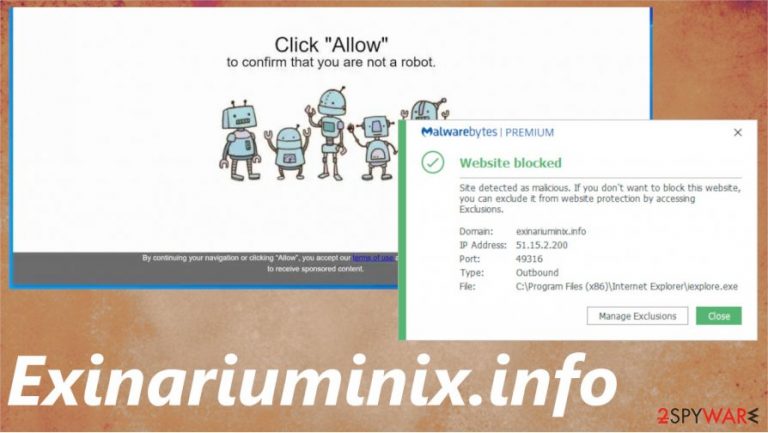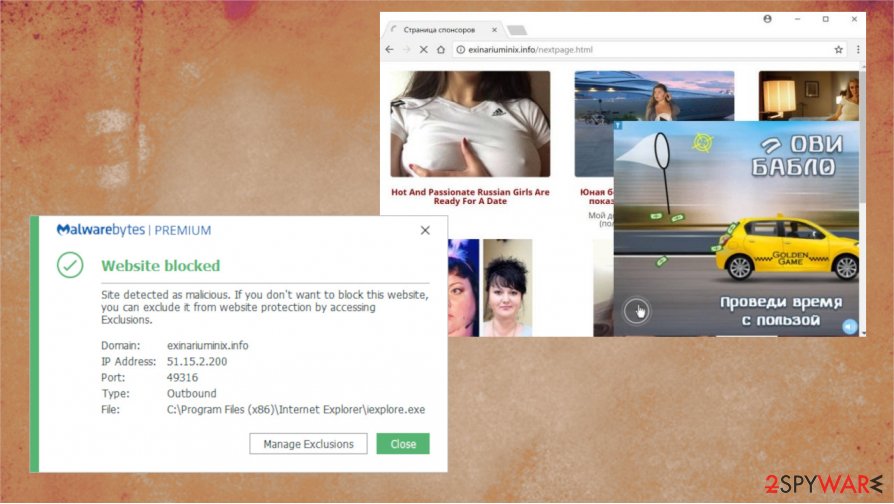Exinariuminix.info (Free Instructions) - Chrome, Firefox, IE, Edge
Exinariuminix.info Removal Guide
What is Exinariuminix.info?
Exinariuminix.info – intrusive adware that constantly shows suspicious ads

Exinariuminix.info is categorized as adware because it shows intrusive ads, banners, and redirects its users to random sites. Furthermore, this potentially unwanted program (PUP) inserts itself into the “Scheduled tasks” by editing the computer's registry, thus ensuring that it will start whenever the browser is opened.
Most of the adware, along with Exinariuminix.info PUP, is considered as PUPs because they end up on computer user systems without their knowledge, i.e., without their consent. This adware is distributed mainly with software bundles, meaning software installation packages of at least 2 or more apps.
| name | Exinariuminix.info |
|---|---|
| type | Adware/ potentially unwanted program |
| distribution | Deceptive ads, software bundles |
| symptoms | Constant pop-up ads, banners, and redirections to different pages while browsing |
| issues | If users click on sponsored ads, they could get more unwanted applications or some more severe malware |
| Adware removal | Remove Exinariuminix.info with trustworthy anti-malware software all its remains are deleted |
| System fix | Since this adware edits system registry and possibly other system core setting, it is recommended that after Exinariuminix.info removal users use the FortectIntego tool to revert any of these modifications |
Exinariuminix.info isn't considered as severe malware (like Lisp ransomware) just because it doesn't bear any viruses or malicious codes within it. But with the constant ad pushing (sometimes an ad could take half the screen) users might click on some of them and that may lead to additional unwanted app installations which might be hazardous.
The same goes for the continuous redirections to sponsored and promotional sites. Usually, to promote their websites, their owners might pay such adware creators to increase their popularity and sales. Exinariuminix.info virus is involved in various malvertising campaigns that might get intrusive.
Some of these sites might be harmless, but some might have malicious codes or apps in them. Developers of Exinariuminix.info promote whoever pays most, so it's dangerous to keep this adware on any device.
Furthermore, Exinariuminix.info adware is known for browsing data collection, i.e. it stores data of what its user type in search bars, what websites they visit, their IP addresses, geolocations, and so on. This data can also be sold to the highest bidder. It might be used for marketing or malicious purposes.

We suggest using time-proven software like SpyHunter 5Combo Cleaner or Malwarebytes to remove Exinariuminix.info and all its elements. When users have a trustworthy antimalware app the redirection to malicious sites is prevented because the anti-virus engines recognize these sites and don't allow them to be opened.
Adware modifies the computer's registry entries, and possibly other system settings, so after Exinariuminix.info removal experts[1] highly recommend using the FortectIntego system tune-up tool to perform a full system scan and restore any changes that the adware might have done.
Adware spreading techniques
Different malware[2] is distributed in different ways. Each day the cybercriminals are trying to outthink everyday computer users by hiding their creations in various locations spread out throughout the internet. In this day and age, a trustworthy, professional anti-malware app that can prevent various malware from gaining access to a computer is a must.

As a manner of principle, almost all adware is distributed with freeware[3] software bundles. In other words, people download an installation pack for their desired software but rarely do they know that other programs will be installed with it.
Never choose the Express/Quick Installation option when installing some freeware. In this mode, all other software, whatever it might be, will be installed automatically, because all installation boxes are pre-selected. That's how adware gets onto computers and starts to impede users browsing experiences.
When installing freeware, users should always pick the Advanced or Custom Installation option and look through the software that would have been installed on their devices. If you're not interested in the offered apps, just deselect the pre-ticked boxes and continue step by step.
Guidelines for Exinariuminix.info removal and system health check
Intrusive Exinariuminix.info virus and other adware isn't hazardous malware, but it can lead to more serious computer infections, and surely ruins everyone's browsing experience with constant ad pushing, redirections, and so on. There are no pros to leaving this piece of software on any device, only cons.
All malware removal should be entrusted to professional anti-malware software, so to remove Exinariuminix.info from your computer we advise using a trustworthy anti-virus app that will find and remove the virus with all its elements.
Since this adware inserts itself into the system registry, it might have done other damage to system settings as well. Therefore, we recommend using a powerful system tune-up tool to remove any changes that the Exinariuminix.info might have done.
You may remove virus damage with a help of FortectIntego. SpyHunter 5Combo Cleaner and Malwarebytes are recommended to detect potentially unwanted programs and viruses with all their files and registry entries that are related to them.
Getting rid of Exinariuminix.info. Follow these steps
Uninstall from Windows
Remove Exinariuminix.info from the machine by finding the app in Control Panel
Instructions for Windows 10/8 machines:
- Enter Control Panel into Windows search box and hit Enter or click on the search result.
- Under Programs, select Uninstall a program.

- From the list, find the entry of the suspicious program.
- Right-click on the application and select Uninstall.
- If User Account Control shows up, click Yes.
- Wait till uninstallation process is complete and click OK.

If you are Windows 7/XP user, proceed with the following instructions:
- Click on Windows Start > Control Panel located on the right pane (if you are Windows XP user, click on Add/Remove Programs).
- In Control Panel, select Programs > Uninstall a program.

- Pick the unwanted application by clicking on it once.
- At the top, click Uninstall/Change.
- In the confirmation prompt, pick Yes.
- Click OK once the removal process is finished.
Delete from macOS
Remove items from Applications folder:
- From the menu bar, select Go > Applications.
- In the Applications folder, look for all related entries.
- Click on the app and drag it to Trash (or right-click and pick Move to Trash)

To fully remove an unwanted app, you need to access Application Support, LaunchAgents, and LaunchDaemons folders and delete relevant files:
- Select Go > Go to Folder.
- Enter /Library/Application Support and click Go or press Enter.
- In the Application Support folder, look for any dubious entries and then delete them.
- Now enter /Library/LaunchAgents and /Library/LaunchDaemons folders the same way and terminate all the related .plist files.

Remove from Microsoft Edge
Delete unwanted extensions from MS Edge:
- Select Menu (three horizontal dots at the top-right of the browser window) and pick Extensions.
- From the list, pick the extension and click on the Gear icon.
- Click on Uninstall at the bottom.

Clear cookies and other browser data:
- Click on the Menu (three horizontal dots at the top-right of the browser window) and select Privacy & security.
- Under Clear browsing data, pick Choose what to clear.
- Select everything (apart from passwords, although you might want to include Media licenses as well, if applicable) and click on Clear.

Restore new tab and homepage settings:
- Click the menu icon and choose Settings.
- Then find On startup section.
- Click Disable if you found any suspicious domain.
Reset MS Edge if the above steps did not work:
- Press on Ctrl + Shift + Esc to open Task Manager.
- Click on More details arrow at the bottom of the window.
- Select Details tab.
- Now scroll down and locate every entry with Microsoft Edge name in it. Right-click on each of them and select End Task to stop MS Edge from running.

If this solution failed to help you, you need to use an advanced Edge reset method. Note that you need to backup your data before proceeding.
- Find the following folder on your computer: C:\\Users\\%username%\\AppData\\Local\\Packages\\Microsoft.MicrosoftEdge_8wekyb3d8bbwe.
- Press Ctrl + A on your keyboard to select all folders.
- Right-click on them and pick Delete

- Now right-click on the Start button and pick Windows PowerShell (Admin).
- When the new window opens, copy and paste the following command, and then press Enter:
Get-AppXPackage -AllUsers -Name Microsoft.MicrosoftEdge | Foreach {Add-AppxPackage -DisableDevelopmentMode -Register “$($_.InstallLocation)\\AppXManifest.xml” -Verbose

Instructions for Chromium-based Edge
Delete extensions from MS Edge (Chromium):
- Open Edge and click select Settings > Extensions.
- Delete unwanted extensions by clicking Remove.

Clear cache and site data:
- Click on Menu and go to Settings.
- Select Privacy, search and services.
- Under Clear browsing data, pick Choose what to clear.
- Under Time range, pick All time.
- Select Clear now.

Reset Chromium-based MS Edge:
- Click on Menu and select Settings.
- On the left side, pick Reset settings.
- Select Restore settings to their default values.
- Confirm with Reset.

Remove from Mozilla Firefox (FF)
Remove dangerous extensions:
- Open Mozilla Firefox browser and click on the Menu (three horizontal lines at the top-right of the window).
- Select Add-ons.
- In here, select unwanted plugin and click Remove.

Reset the homepage:
- Click three horizontal lines at the top right corner to open the menu.
- Choose Options.
- Under Home options, enter your preferred site that will open every time you newly open the Mozilla Firefox.
Clear cookies and site data:
- Click Menu and pick Settings.
- Go to Privacy & Security section.
- Scroll down to locate Cookies and Site Data.
- Click on Clear Data…
- Select Cookies and Site Data, as well as Cached Web Content and press Clear.

Reset Mozilla Firefox
If clearing the browser as explained above did not help, reset Mozilla Firefox:
- Open Mozilla Firefox browser and click the Menu.
- Go to Help and then choose Troubleshooting Information.

- Under Give Firefox a tune up section, click on Refresh Firefox…
- Once the pop-up shows up, confirm the action by pressing on Refresh Firefox.

Remove from Google Chrome
Delete malicious extensions from Google Chrome:
- Open Google Chrome, click on the Menu (three vertical dots at the top-right corner) and select More tools > Extensions.
- In the newly opened window, you will see all the installed extensions. Uninstall all the suspicious plugins that might be related to the unwanted program by clicking Remove.

Clear cache and web data from Chrome:
- Click on Menu and pick Settings.
- Under Privacy and security, select Clear browsing data.
- Select Browsing history, Cookies and other site data, as well as Cached images and files.
- Click Clear data.

Change your homepage:
- Click menu and choose Settings.
- Look for a suspicious site in the On startup section.
- Click on Open a specific or set of pages and click on three dots to find the Remove option.
Reset Google Chrome:
If the previous methods did not help you, reset Google Chrome to eliminate all the unwanted components:
- Click on Menu and select Settings.
- In the Settings, scroll down and click Advanced.
- Scroll down and locate Reset and clean up section.
- Now click Restore settings to their original defaults.
- Confirm with Reset settings.

Delete from Safari
Remove unwanted extensions from Safari:
- Click Safari > Preferences…
- In the new window, pick Extensions.
- Select the unwanted extension and select Uninstall.

Clear cookies and other website data from Safari:
- Click Safari > Clear History…
- From the drop-down menu under Clear, pick all history.
- Confirm with Clear History.

Reset Safari if the above-mentioned steps did not help you:
- Click Safari > Preferences…
- Go to Advanced tab.
- Tick the Show Develop menu in menu bar.
- From the menu bar, click Develop, and then select Empty Caches.

After uninstalling this potentially unwanted program (PUP) and fixing each of your web browsers, we recommend you to scan your PC system with a reputable anti-spyware. This will help you to get rid of Exinariuminix.info registry traces and will also identify related parasites or possible malware infections on your computer. For that you can use our top-rated malware remover: FortectIntego, SpyHunter 5Combo Cleaner or Malwarebytes.
How to prevent from getting adware
Stream videos without limitations, no matter where you are
There are multiple parties that could find out almost anything about you by checking your online activity. While this is highly unlikely, advertisers and tech companies are constantly tracking you online. The first step to privacy should be a secure browser that focuses on tracker reduction to a minimum.
Even if you employ a secure browser, you will not be able to access websites that are restricted due to local government laws or other reasons. In other words, you may not be able to stream Disney+ or US-based Netflix in some countries. To bypass these restrictions, you can employ a powerful Private Internet Access VPN, which provides dedicated servers for torrenting and streaming, not slowing you down in the process.
Data backups are important – recover your lost files
Ransomware is one of the biggest threats to personal data. Once it is executed on a machine, it launches a sophisticated encryption algorithm that locks all your files, although it does not destroy them. The most common misconception is that anti-malware software can return files to their previous states. This is not true, however, and data remains locked after the malicious payload is deleted.
While regular data backups are the only secure method to recover your files after a ransomware attack, tools such as Data Recovery Pro can also be effective and restore at least some of your lost data.
- ^ Odstranitvirus. Odstranitvirus. Spyware news and security.
- ^ Roger A. Grimes. 9 types of malware and how to recognize them. CSO. Security news, features and analysis.
- ^ Freeware. Wikipedia. The free encyclopedia.
